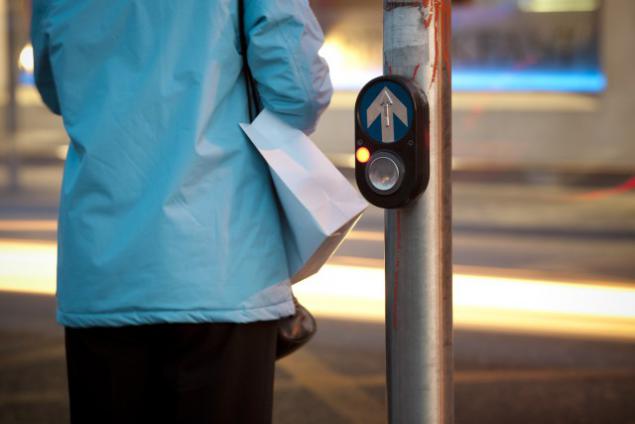639
"Buttons placebo": we accept wishful thinking
Some buttons are pressed bespoleznoPoezd suited to one of the busiest stations of the London Underground. This early Thursday morning. The crowd of passengers going on the platform and inside the train, waiting for the opening of doors.
A person standing closest to the door, patience ends. He pushes the square button with a green rim and the inscription "Open". A moment later the door obediently parted. A crowd of people coming out of the train, another group comes in, and the journey continues. It is unlikely that the passenger knew that his thumb is in no way influenced the door opener.

Some would call this piece "button placebo." Objectively speaking, there is no control over the system, it does not, but the user creates a psychological feeling that such control he has. It turns out there are a lot of buttons and even the technology that absolutely nothing doing and created exclusively to deceive us.
And that's what really surprising: many argue that we really benefit from the illusion of control even when, from the point of view of an observer, does not control.

In 2013, the writer of the BBC News Magazine, Tom de Castella found that pedestrian crossings in the UK - a real "hotbeds buttons placebo." For example, at traffic lights at crossings in central London there is a certain interval of the inclusion of red and green light. A press of the button can change this interval only from midnight to 7 am.
Some psychologists say that the keys do have a certain effect, only a traffic light, he has nothing to do. The effect is observed in human minds.
To understand this, you should go back to the beginning of the 70s. Ellen Langer, a psychologist at the time and now a professor at Harvard, was a graduate student at Yale University.

One day she went to the casino, where she met the players on the "one-armed bandits" who had "carefully considered" ways to pull the lever machine. In addition, it is "very rational" fellow student once tried to convince her that you can throw away a winning pair of dice, thinking intensely about the desired combination.
"People actually believed that such conduct can improve their probability of winning," - says it. Of course, they were wrong, and for many this explanation would be enough. But not for Langer. The power of persuasion from gamblers is, in her opinion, a very unusual thing.

"The desired state" article with the headline that made her famous, Ellen Langer wrote in 1975. She spoke about the importance of beliefs and coined the term to the effect that these beliefs have had on people. She called it "an illusion of control».
This phenomenon Langer demonstrated in an experiment by forcing the subjects to play the lottery. Some of the participants were able to choose lottery tickets, and some of them were the characters more or less familiar subjects.
Ticket type does not affect their chances of winning, but they seemed to think that the influence is. Those who have chosen tickets with familiar characters in the exchange part with them very reluctant, compared to the holders of tickets with no characters.
Instead of classifying this as irrational delusion Langer introduced this effect in a positive light: "The feeling that you have control over the world - this is the desired state».
And when it comes to all these useless buttons at traffic lights, here, according to Langer, there are a number of reasons why the placebo effect can be regarded as something useful.
"Doing something is better than doing nothing, because people believe - she says. - And when you go and press the button, your attention is focused on the actions of your hand. If I'm just going to stand in the corner, then I can not see the traffic light switch or notice a green light at the last moment and eventually expose his life to danger.
In addition, if more pedestrian standing at a crossroads, in turn, push the button, it creates in them a sense of unity with strangers who, without buttons would not arise. All of this can be seen as points, have a positive impact on our mental state and even at the level of our social interaction ».
Fake shumyPravda that technology for a long time we have been deceived. Sometimes it was questionable from an ethical point of view, but in other cases it is useful for users because they have a belief that the system is working as it should.

Programmer Eytan Adar from the University of Michigan in the document, written in collaboration with two researchers at Microsoft, described a number of "benign deception».
Take the phone system 60-ies. Sometimes after dialing connection is not established properly. But instead of reporting an error to the caller, the system redirects the call just completely random person.
"The caller, thinking that he just made a mistake with a dial, call back again. As a result, the error disappears, and the illusion of reliability phone system is maintained, "- the document says.
Like the telephone system 60, Netflix video streaming service also developed ways to "elegant rejection", as it is called Adar, when the system of personal advice service suddenly gives failure. Rather than make the obvious failure of the system, on the home page of the Netflix just beginning to show the popular series and films.
But be that as it may, there are plenty of ways to cheat, as "benign" and not so.
As an example, he cites the players in computer games, "programmed" to be stupid. I think the players are learning the new game more enjoyable if their artificial opponent obviously doomed to lose, especially if they do not realize that it is actually in this game depends solely on them.

Intriguing illyuziiNezavisimo of whether you feel cheated or not, this effect is largely benefits: people feel that the world around them happy that they are better monitored events and calms the obvious efficiency of their operations.
But that if the illusion of control had negative effects? And what if these effects make people do something harmful, not only for themselves, but for society?

These questions were raised by Mark Fenton-O'Krivi and his fellow researchers. In 2003, they published a study on the illusion of control traders. In the experiment, traders reported that pressing certain keys on the keyboard "may in some way affect" the level of financial index, its rise and fall.
In reality, however, these buttons have no effect on the index is not provided, and all his movements were pre-determined. But some traders actually felt that they really had the effect of pushing. For this reason, the level of subordination of the illusion of control was classified as high.
In 2008, the world economy suffered as a result of the collapse of several financial institutions, which resulted in a financial crisis. Do not penetrated the illusion of control in the banks, which in the end produces more mortgage loans than it should? Fenton O'Krivi thinks it's very likely.
"Most banks have a clear understanding of the relationship between risk and return. So if you suddenly find that they are ready to get high profit in the market, then, obviously, we must ask: "If we get an unusually high level of income, what are the risks we have to take?"
Obviously, those people do not ask such questions, "- he says. In this case, the illusion of control may have helped to undermine the economy and business, jeopardize the lives of millions of people.
via www.bbc.com/future/story/20150415-the-buttons-that-do-nothing
A person standing closest to the door, patience ends. He pushes the square button with a green rim and the inscription "Open". A moment later the door obediently parted. A crowd of people coming out of the train, another group comes in, and the journey continues. It is unlikely that the passenger knew that his thumb is in no way influenced the door opener.

Some would call this piece "button placebo." Objectively speaking, there is no control over the system, it does not, but the user creates a psychological feeling that such control he has. It turns out there are a lot of buttons and even the technology that absolutely nothing doing and created exclusively to deceive us.
And that's what really surprising: many argue that we really benefit from the illusion of control even when, from the point of view of an observer, does not control.

In 2013, the writer of the BBC News Magazine, Tom de Castella found that pedestrian crossings in the UK - a real "hotbeds buttons placebo." For example, at traffic lights at crossings in central London there is a certain interval of the inclusion of red and green light. A press of the button can change this interval only from midnight to 7 am.
Some psychologists say that the keys do have a certain effect, only a traffic light, he has nothing to do. The effect is observed in human minds.
To understand this, you should go back to the beginning of the 70s. Ellen Langer, a psychologist at the time and now a professor at Harvard, was a graduate student at Yale University.

One day she went to the casino, where she met the players on the "one-armed bandits" who had "carefully considered" ways to pull the lever machine. In addition, it is "very rational" fellow student once tried to convince her that you can throw away a winning pair of dice, thinking intensely about the desired combination.
"People actually believed that such conduct can improve their probability of winning," - says it. Of course, they were wrong, and for many this explanation would be enough. But not for Langer. The power of persuasion from gamblers is, in her opinion, a very unusual thing.

"The desired state" article with the headline that made her famous, Ellen Langer wrote in 1975. She spoke about the importance of beliefs and coined the term to the effect that these beliefs have had on people. She called it "an illusion of control».
This phenomenon Langer demonstrated in an experiment by forcing the subjects to play the lottery. Some of the participants were able to choose lottery tickets, and some of them were the characters more or less familiar subjects.
Ticket type does not affect their chances of winning, but they seemed to think that the influence is. Those who have chosen tickets with familiar characters in the exchange part with them very reluctant, compared to the holders of tickets with no characters.
Instead of classifying this as irrational delusion Langer introduced this effect in a positive light: "The feeling that you have control over the world - this is the desired state».
And when it comes to all these useless buttons at traffic lights, here, according to Langer, there are a number of reasons why the placebo effect can be regarded as something useful.
"Doing something is better than doing nothing, because people believe - she says. - And when you go and press the button, your attention is focused on the actions of your hand. If I'm just going to stand in the corner, then I can not see the traffic light switch or notice a green light at the last moment and eventually expose his life to danger.
In addition, if more pedestrian standing at a crossroads, in turn, push the button, it creates in them a sense of unity with strangers who, without buttons would not arise. All of this can be seen as points, have a positive impact on our mental state and even at the level of our social interaction ».
Fake shumyPravda that technology for a long time we have been deceived. Sometimes it was questionable from an ethical point of view, but in other cases it is useful for users because they have a belief that the system is working as it should.

Programmer Eytan Adar from the University of Michigan in the document, written in collaboration with two researchers at Microsoft, described a number of "benign deception».
Take the phone system 60-ies. Sometimes after dialing connection is not established properly. But instead of reporting an error to the caller, the system redirects the call just completely random person.
"The caller, thinking that he just made a mistake with a dial, call back again. As a result, the error disappears, and the illusion of reliability phone system is maintained, "- the document says.
Like the telephone system 60, Netflix video streaming service also developed ways to "elegant rejection", as it is called Adar, when the system of personal advice service suddenly gives failure. Rather than make the obvious failure of the system, on the home page of the Netflix just beginning to show the popular series and films.
But be that as it may, there are plenty of ways to cheat, as "benign" and not so.
As an example, he cites the players in computer games, "programmed" to be stupid. I think the players are learning the new game more enjoyable if their artificial opponent obviously doomed to lose, especially if they do not realize that it is actually in this game depends solely on them.

Intriguing illyuziiNezavisimo of whether you feel cheated or not, this effect is largely benefits: people feel that the world around them happy that they are better monitored events and calms the obvious efficiency of their operations.
But that if the illusion of control had negative effects? And what if these effects make people do something harmful, not only for themselves, but for society?

These questions were raised by Mark Fenton-O'Krivi and his fellow researchers. In 2003, they published a study on the illusion of control traders. In the experiment, traders reported that pressing certain keys on the keyboard "may in some way affect" the level of financial index, its rise and fall.
In reality, however, these buttons have no effect on the index is not provided, and all his movements were pre-determined. But some traders actually felt that they really had the effect of pushing. For this reason, the level of subordination of the illusion of control was classified as high.
In 2008, the world economy suffered as a result of the collapse of several financial institutions, which resulted in a financial crisis. Do not penetrated the illusion of control in the banks, which in the end produces more mortgage loans than it should? Fenton O'Krivi thinks it's very likely.
"Most banks have a clear understanding of the relationship between risk and return. So if you suddenly find that they are ready to get high profit in the market, then, obviously, we must ask: "If we get an unusually high level of income, what are the risks we have to take?"
Obviously, those people do not ask such questions, "- he says. In this case, the illusion of control may have helped to undermine the economy and business, jeopardize the lives of millions of people.
via www.bbc.com/future/story/20150415-the-buttons-that-do-nothing
"Auditory illusions": the most strange sounds in the world
The mayor, who manages the city with the help of Twitter






















